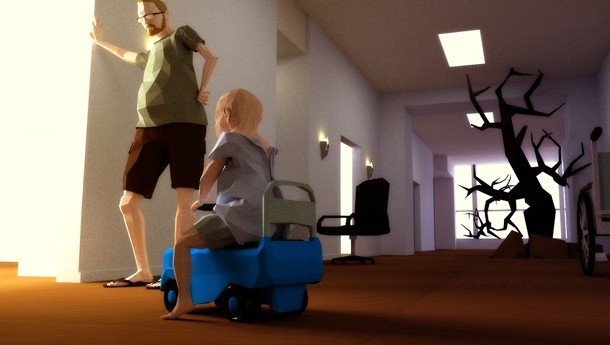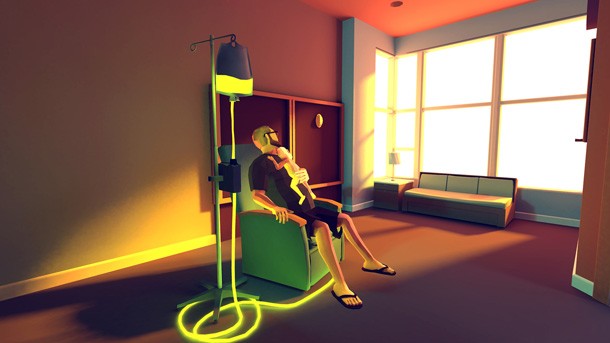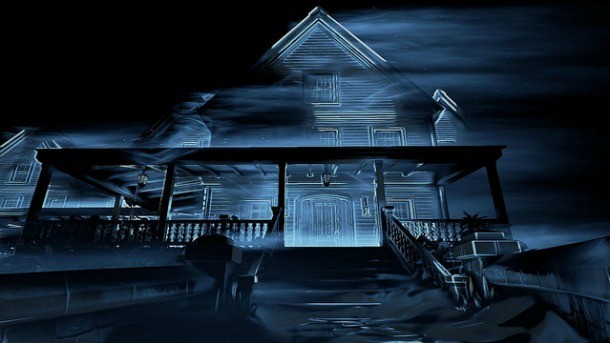Inside The Lives Of Families And Couples That Make Games Together

Building and sustaining a healthy relationship has its share of ups and downs, and mixing that with game development can be an even greater feat. Although the term “don’t mix business with pleasure” suggests relationships and work should remain sepa- rate, some couples in the games industry believe otherwise. From Perception’s developer duo running a studio from home while taking care of four kids, to the family trauma that drove That Dragon, Cancer’s creators to build an emotional game, it’s clear that for some, making games is best accomplished when it’s a two-way street.
This feature article originally appeared in issue #291 of Game Informer magazine.
Two Is Better Than One
Putting aside differences is one thing, but for Amanda and Bill Gardner, the creators of horror game Perception, differing backgrounds ended up in influencing their work in positive ways. By combining their diverse talents and applying them toward the game, they found innovation through each other’s strengths.
Perception’s concept, which puts you in the shoes of a blind woman who uses echolocation to navigate a haunted house, is something Bill came up with in grad school after a creative exercise. Following the closure of Irrational Games, his prior employer, he switched over to the indie scene and began collaborating with his wife to make Perception.
With Amanda’s background in English and Bill being a games industry veteran, the two come from significantly different areas. Learning the ropes happens on both sides, with Bill better understanding the ins and outs of literary references, and Amanda rethinking how a story can be told for an interactive medium.
“If you’re a couple working together, it’s very important to take a step back and constantly evaluate where you’re at and how things are working,” Bill says. “Because I’ve collaborated with Amanda for so long, it’s easy for me to forget that she doesn’t know every last little inside-baseball term we have in games.”
They may have different backgrounds, but their love of games is mutually strong. Video games are a family affair, and often they play with their four kids. Even their infant daughter, Rinoa, is named after the Final Fantasy VIII character. Despite different career paths, their similar interests in movies, shows, and more has made collaboration easier.
“We’ve been together for 17 years,” Amanda says. “I can reference a scene or thing and know we’ve seen it together. It definitely cuts the time down because you don’t have to explain it.”
Amanda and Bill aren’t the only couple that see collaborating on video game development as a positive experience. James and Michelle Silva, who have been married for five years, developed action/RPG Salt & Sanctuary together.
The two are so passionate about their work that even during their honeymoon they would spend evenings working on their game. “I mean, what are you supposed to do after dark on your honeymoon, but code tools?” jokes James.
Working under the same roof, and often in the same room, James and Michelle are careful to not push each other’s buttons. They describe themselves as “emotional sponges of each other,” often sharing similar highs and lows. But this doesn’t mean working together is always smooth sailing.

Clashing Perspectives
Working closely with a significant other can be tough, with emotions stronger than they would be with an average coworker. Communication and openness are key to success, but sometimes other factors come into play.
Before Michelle came into his life, James always worked solo. As both programmer and creative lead of Ska Studios, James sees his work largely as his brainchild. Sometimes this balance of control leads to minor conflicts.
“We try really hard to work together and have a shared vision,” James says. “But the problem is I’m the coder and I attach everything together. Subconsciously or otherwise, I tend to just do it my way.”
Despite these difficulties, James and Michelle don’t recall ever having a significant fight that affected their work. Comparatively, Perception’s Amanda and Bill had qualms about working together, but also managed to push through.
“That was something I was personally a little bit apprehensive about going in,” Bill says. “We had collaborated for years and years on everything. I knew her perspective, I knew her style, and all of that. But you know, when you’re actually working in the trenches together, you never know how it’s going to go.”
This uncertainty can be a deal-breaker for some, and certain couples that work on games together face problems that can become unsolvable. This is what happened to Jessica Curry, who stepped down from working alongside her husband Dan Pinchbeck at Everybody's Gone to the Rapture developer The Chinese Room in 2015. In a lengthy blog post, she noted how working alongside her husband caused issues. Whether it was the press giving all the credit to her husband, or even Dan himself discrediting her, she felt it was wise and healthy to step away from working alongside him.
“On a personal level I look back at my huge contribution to the games that we’ve made and I have had to watch Dan get the credit time and time again,” Curry wrote in the post. “I’ve realized that the only way I’m going to get credit for the work that I do is if I take a step away from Dan.”
This decision, while difficult, helped the couple move past this problem. As for Amy and Ryan Green, a couple from Colorado, they turned to game development to cope with trauma and heartbreak.

Collaborating On Real-Life Experiences
When Amy and Ryan first began making That Dragon, Cancer, a game about their young son Joel’s battle with cancer, they believed wholeheartedly he was going to live. When he passed away at the age of five, the game’s tone and premise shifted, and so did the couple’s relationship.
At one year old, Joel was diagnosed with a cancerous brain tumor. Nearing the age of two, doctors told the Greens he had three weeks to four months to live. Despite this, Joel kept living for a few more years. The couple began working on That Dragon, Cancer, feeling as though they were “documenting a miracle.”
When Joel passed away midway through the game’s development, Amy explains that the creative direction “pivoted a little bit.” Nonetheless, hope was a strong emotion they wished for the game to convey, because of their Christian faith, resilience, and love for their son.
Amy says after hearing the game pitch from Ryan, she felt apprehensive. “I told him that’s not a game,” she says. “No one wants to play something terrible. It was terrible to live [through]. But I think at that point I just wasn't as aware of the whole genre of meaningful games.”
Following positive reception from the game’s reveal, both Amy and Ryan felt it was clear that the game had promise – not just as a way to process the difficult emotions from the trauma, but to share their story in a meaningful way.
To make both their relationship and game work, Amy and Ryan had to be incredibly honest with each other. Instead of struggling to communicate, often they are guilty of communicating too much.
Wavering faith and a sense of despair were constant issues, but were then used as fuel for That Dragon, Cancer. For example, midway through the game, Amy sits in a boat while Ryan struggles to stay a oat in the water. It’s a symbolic moment that gives insight into the friction between the two. When difficulties arose, Amy would look to her faith for answers, feeling strongly that things would prevail, whereas Ryan could feel hopeless. “It was challenging to have Ryan sometimes be so despairing when I felt so full of faith,” Amy says.
Despite the hardships, neither Amy nor Ryan ever considered stopping production on That Dragon, Cancer. With their faith and empathy for one another, they managed to continue development. Ryan explains that he sees the game as a “gift to his family,” and a snapshot of their life when Joel was still by their side.

A Balancing Act
As Perception reached its funding goal on Kickstarter, Bill and Amanda were expecting their third child. Halfway through production, Amanda became pregnant again. With a house of four young kids that also acts as the game’s studio, a philosophy of exibility runs deep for the Gardners.
“You have to be flexible and you have to have no expectations,” Amanda says. “You have to understand that you never know what’s going to happen.”
The Gardners’ development studio, The Deep End Games, consists of Amanda, Bill, and their sound designer, as well as hired contractors that work remotely. Perception was mostly brought to life in the couple’s basement away from the kids.
Bill and Amanda find working from home can be hectic, explaining that kids’ schedules are “complicated” and that they must constantly adapt, but both are thankful to be as involved as they are in their family’s home life.
“It’s great to be able to just walk upstairs [to be with the kids]. Just being able to go out, that is my way of getting a breather,” Bill says. “It’s sort of grounding to reality because outside of that, I’m always entirely in the game world.”
Like most things, balance and moderation can be healthy. For Salt & Sanctuary’s James and Michelle Silva, they believe this is their secret to success. To wind down after a stressful day, the two do activities together, such as playing games or taking a workout class.
“As much as it’s fun to work all the time when you’re working on games, it’s better for your health and your relationship to get out of that zone for a while and like go out somewhere together, work out together,” Michelle says. “I’ve found that when we go do a workout class together, we’re much happier together afterward.”
Mutual interests and a combined passion drive these couples toward successful game development, but it’s not always easy to collaborate. As games become more advanced and demanding to make, working as a couple is not always ideal. But with collective patience, communication, and a balanced life, the couples behind games like Perception and Salt & Sanctuary prove it’s possible, as well as rewarding, to make games collaboratively with loved ones.

Get the Game Informer Print Edition!
Explore your favorite games in premium print format, delivered to your door.
- 10 issues per year
- Only $4.80 per issue
- Full digital magazine archive access
- Since 1991









